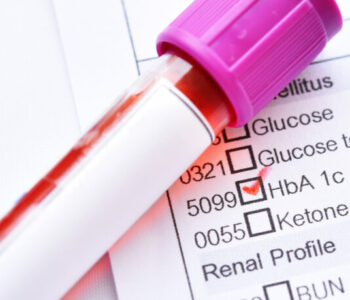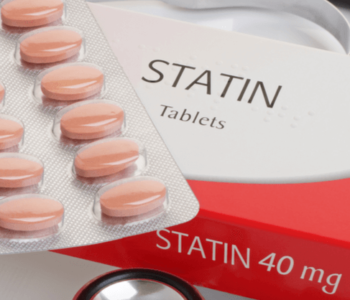In 30 seconds…
TSH, or Thyroid-stimulating hormone, is important because it tells your thyroid how much of each essential hormone to make for the rest of your body. Normal TSH levels differ between genders and ages, though generally the normal range is between 0.4-4 mU/l (milliunits per litre).
Managing Thyroid Health
Most healthy adults tend to forget it’s there. But the thyroid – the butterfly-shaped gland in your neck – plays a crucial role in regulating your metabolism, your heart rate, and your body temperature. And when things go a little wrong, which they can, you will definitely notice.
Thyroid disorders don’t affect men quite as often as women. However, it’s vital that you know the risks and how to manage any possible thyroid problem. The first step in assessing your thyroid health is a blood test – specifically a thyroid function test.
Here, we’re looking at one of the hormones that the thyroid function test measures: thyroid-stimulating hormone, or TSH. Read on to find out what this hormone does and what normal TSH levels are.
What is Thyroid Stimulating Hormone (TSH)?
Thyroid-stimulating hormone (TSH) is a hormone produced by the pituitary gland that encourages your thyroid to produce hormones. In short, your thyroid needs TSH to do its job in maintaining your metabolism and heart rate.
The thyroid gland’s primary function is to produce thyroxine, or T4. This is a hormone that enters into your bloodstream and travels to the liver and kidneys, where it’s converted into triiodothyronine, or T3. Triiodothyronine then does the important work in regulating your heart rate, digestion, muscle and bone maintenance, and temperature.
TSH kickstarts this whole endocrine chain. Any disruptions to the production of this hormone – or the pituitary gland – will have an impact on your thyroid health and could cause one of the following:
- Overactive thyroid (hyperthyroidism). When your thyroid produces too much thyroxine, you may experience anxiety, difficulty sleeping, mood swings, and fatigue.
- Underactive thyroid (hypothyroidism). Tiredness, weight gain, and muscle cramps are all common symptoms.
The TSH Test
As a result, measuring and monitoring your TSH levels is an integral part of staying on top of your thyroid health. A TSH test – a blood test that measures TSH levels – is the easiest way to do this.
A TSH test is usually done as part of thyroid function tests, which also measure your levels of free T4 and free T3. You can do these if you feel you’re experiencing symptoms of a thyroid problem, or if you’re feeling totally fine, but still want a health check-up.
The TSH test gives you an essential insight, as it can show you whether you have a problem with the thyroid gland itself or with the pituitary gland that produces TSH. However, you will need to know how to interpret these results.
So, What Are Normal TSH Levels?
According to the British Thyroid Foundation, normal TSH levels are between 0.4 and 4.0 mU/l, or milliunits per litre. This is a general guide that covers all genders, ages, and lifestyles. If your results fall between these two limits, you are looking at pretty normal TSH levels.
Here are your reference ranges:
- Normal TSH levels: 0.4 – 4.0 mU/l
- High TSH: > 4.1 mU/l
- Low TSH: < 0.5 mU/l
However, research has found that TSH levels can differ significantly from person to person. For example, one large study found that it’s quite normal for older people to have high TSH levels – without this being a sign of any thyroid disease. And while women are more likely to experience problems with the thyroid than men, the study suggests that men are more likely to have low TSH levels overall.
By the way, the same study (confirmed by a long history of research) found that you’re also more likely to have high levels of TSH if you have diabetes.
Interpreting Your TSH Test Results
So, what does all this mean in practice? Before you jump to any conclusions, it’s crucial that you take the full range of thyroid function tests. While a low or elevated TSH level may suggest that you have a thyroid condition, other tests will help clarify what this might be.
To get the fullest picture, you should take a thyroxine (T4) and triiodothyronine (T3) test alongside a TSH test. Let’s run through some different scenarios the results may show:
- Low TSH and high T4 levels: This suggests that you have an overactive thyroid (hyperthyroidism), in which your thyroid produces too much thyroid hormone.
- Low TSH and high T3 levels: Also a sign of hyperthyroid.
- High TSH and low T3 and T4: This is usually a sign of hypothyroidism, or an underactive thyroid. It means that there is a problem with your thyroid that is preventing it from producing enough hormones.
- Low TSH and low T3 and T4: This tends to signal that you have hypothyroidism, but it doesn’t originate from your thyroid itself. Instead, a problem with your pituitary gland may be causing difficulties downstream.
As a result, while your TSH results are an essential piece of information for your health and wellbeing, a complete picture of your thyroid hormone levels is key to an effective diagnosis.
Find out more: Understanding Thyroid Function Test Results
Further Thyroid Tests
Thyroid hormone tests are not the only tests that you can do to assess the health of your thyroid. If you did not have normal TSH levels, you might need to do two further tests: a thyroid antibody test or an isotope thyroid scan.
Thyroid antibody tests can be handy for clarifying some particular thyroid problems. It can happen, for example, that the thyroid is affected by an autoimmune disease such as Graves’ disease or Hashimoto’s thyroiditis. In these cases, your body makes antibodies that attack your thyroid, making it overactive or underactive. Antibody tests can tell you if this is the cause of your thyroid dysfunction.
An isotope thyroid scan, meanwhile, is also helpful to give you a better idea of the cause of your thyroid problem. You will need to ingest a small amount of an isotope – and the amount absorbed by your thyroid can help a diagnosis of thyroid nodules, thyroid cancer, or other conditions like Graves’ disease.

Help your body fight the good fight
Supplements are all-important when it comes to keeping your health at its best. All our health supplements are formulated by our medical team and packed with the best ingredients out there.
Key Takeaways
Generally, normal TSH levels are between 0.4 and 4.0 mU/l. Older people, and people with diabetes, are thought to have slightly higher TSH levels.
If your TSH levels are not within the normal range, it’s best to take the full range of thyroid function tests. These can help you understand whether you have a condition affecting your thyroid, such as Graves’ disease or thyroid nodules.
FAQs
What does the thyroid do?
The thyroid produces various hormones which regulate your metabolism, heart rate, and body temperature: three of the most essential functions in the human body! Your thyroid is regulated by another hormone, called TSH, or thyroid-stimulating hormone.
What are the signs that my TSH levels are imbalanced?
If your body is producing too much TSH or too little, you may experience any one of the following symptoms: anxiety, difficulty sleeping, mood swings, and fatigue (if you have too much TSH), or tiredness, weight gain, and muscle cramps (if you have too little TSH).
How do I know what my TSH levels are?
To know what your thyroid-stimulating hormone levels are you can take a TSH test: a blood test which will check the levels of TSH, T3 and T4 in your system.
What do my TSH test results mean?
TSH levels differ significantly from person to person, so don’t jump to any conclusions. Average healthy TSH levels are between 0.4 and 4.0 mU/l (milliunits per litre). If your TSH levels fall outside this, seek professional advice from your doctor about what steps to take next.











